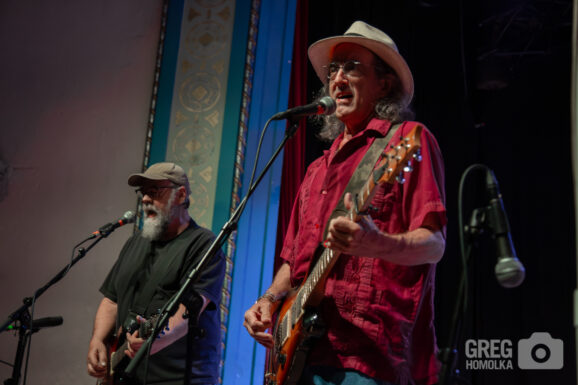[rating=9.00]
 In the twenty years since the group formed in Oklahoma, Jacob Fred Jazz Odyssey has slowly but surely turned itself into an American musical institution (during its most recent history under the tutelage of keyboardist Brian Haas). It is little wonder then that the group, now a trio including guitarist Chris Combs and drummer Josh Raymer, is in no hurry whatsoever to move through it’s new studio album Worker.
In the twenty years since the group formed in Oklahoma, Jacob Fred Jazz Odyssey has slowly but surely turned itself into an American musical institution (during its most recent history under the tutelage of keyboardist Brian Haas). It is little wonder then that the group, now a trio including guitarist Chris Combs and drummer Josh Raymer, is in no hurry whatsoever to move through it’s new studio album Worker.
In fact, the trio floats through the opening track, appropriately titled, “New Bird,” as if intentionally drawing attention to the new alignment, but perhaps just as much so to focus on the atmosphere of the recording, as big and clear sounding as it is. JFJO moves a bit more insistently through the subsequent track, “Appropriation Song,” with frequent stops for some corrosively ambient noise, before embarking with a fittingly jaunty gait into “Betamax.” Recorded live in the studio, this music no doubt sounds wildly colorful in the spontaneity of a stage show, but arguably not much more remarkable than on these tracks in the artful blend of technology and humanity.
There is no contemporary jazz group more cognizant of the passage of time than Jacob Fred, so to title a tune after a video configuration (that close to obsolete still holds some loyalty) makes perfect sense. Yet this band’s never let itself become dated over the course of its own history, to this day remaining true to the concept of the adventure implicit its name. The stripped down likes of Worker follows an ambitious project titled The Race Riot Suite, the live performance of which included a five-piece horn section, but this trio alignment holds its own attraction, as evidenced by “Hey Hey NSA,” if for no other reason that the spacious likes of this new music finds Haas, Combs and Raymer utilizing open air as effectively as densely-woven sound.
The contrast therein generates almost tactile presence as cuts progress. Evocative and vibrant as the cover art inside and out, the sound of this reconfigured JFJO is all enveloping. Details of the arrangements such as that of “Say Nothing” arise progressively from a musicianship in which three players remain keenly aware of each other they interact. The long wide arc of lap steel on “Council Oak” is one of the few conventional sounds that emerges from Worker and it’s so fleeting that, like the album as a whole, it’s dreamlike in its (dis)appearance. The aforementioned clarity of sound produced by the band itself becomes an increasingly significant virtue here as it allows—no compels!–listening to the work of each player individually: the understanding of their chemistry thus becomes one of the album’s major distinctions.
If on no other point than the extended roster of musicians who’ve played in Jacob Fred Jazz Odyssey, the group might draw a reasonable comparison to the vaunted fusion band Weather Report. But it’s fair to say that by the time “Mesa” and “Let Yourself Out” segue into each other and the finale of “The Finder’s Keeper” conjures its audible drama, the original thinking, not to mention the ambition, of JFJO circa 2014 on Worker is very much worth savoring on its own terms.







